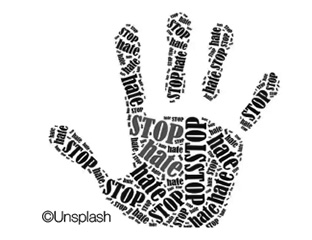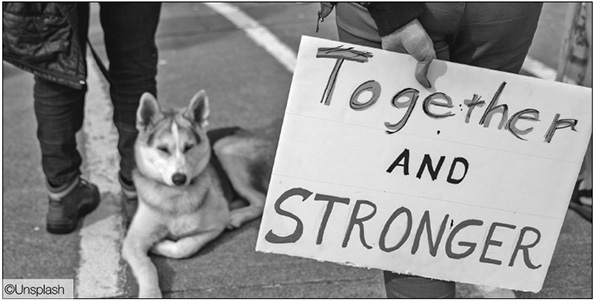
According to a survey conducted by the National Human Rights Commission of the Republic of Korea in 2021, 70.3% of participants had seen or heard hate speech online and offline over the past year. This is a whopping 6.1% increase from 64.2% in 2019. It has clearly become easier to encounter hatred in everyday life.

What do readers think when hearing the word “hatred?” Are they affected by it in any way? Hatred is prevalent in society, and it is typically projected against groups that are perceived to be different. Hatred often manifests in the forms of misogyny, misandry, and regional hatred. This can be seen, for example, in the widespread animosity between people from Gyeongsang-do and Jeolla-do. Not only that, but there is also an aversion to certain classes. Recently, an elderly man at a café was confronted by an employee saying, “Young people do not enter the café because of you, so please leave.” The café employee’s behavior was controversial and received mixed reaction in the online community. Is it okay to take it lightly because it happens casually in society? Let’s consider whether it causes serious problems in society or if it is okay to simply maintain the status quo.
To start, let’s focus on the word, “hatred.” According to the Office of the Attorney General for the District of Columbia, hatred generally starts with bias that is left unchecked. When hatred manifests against a person or group of people, it usually derives from ignorance, anger, fear, a sense of injury, or a perceived threat to the status quo. According to the Philosophical Reflection on Hatred released by Bumhan philosophical society in 2019, hatred is a complex emotion that hates, avoids, and further finds unpleasant. Hatred is not an emotion to be taken lightly, as having a feeling of hate for a specific object eventually leads to toxic hatred of that particular object. People have studied hatred deeply in the past. As an example, Aristotle compared hatred and enmity in his rhetoric. According to him, one of the causes of hostility is anger, an emotion that can be healed over time, but hatred cannot be healed. If the purpose of anger is to cause pain to the object, then the purpose of hatred is to do evil to the object.
A Concept of Hatred
Hatred is largely divided into “primary hatred” and “secondary hatred.” Primary hatred can be said to be a concept that originated in the era when Homo sapiens first came into existence, and in short, it is an instinctive feeling of self-preservation. Homo sapiens adapted to increase their behavioral immune system as the incidence of diseases through physical contact and dirt within the group increased. For this reason, humans have changed to instinctively want to distance themselves from decomposing bodies, food, or patients suffering from diseases. The alertness to these things was expressed through specific actions such as holding the breath and frowning expressions. Wariness causes revolting, and it causes hatred. Therefore, primary hatred can be seen as an emotion that appears naturally according to human evolution. Unlike spontaneous primary hatred, secondary hatred is an acquired phenomenon. It is learned and spreads causing social conflict. It starts with stigmatizing the opponent by thinking about how they are not similar to the majority. The majority does not identify with the few, excludes them, and views them negatively. It does not stop here, but it rejects and abuses the minority, and eventually tries to completely eliminate them. As such, secondary hatred also has a function of strengthening the solidarity of the majority.
Following the concept of hate, hate speech is an act of expressing hatred, antipathy, or hostility toward a specific group. According to the Constitutional Research Institute’s report in 2017, Criteria for the Hate Speech - Focus on Sexual Orientation as a Reason for Prohibition of Discrimination -, hate speech cannot be said to be only discrimination because it that violates equal rights and also infringes on the personal rights of people belonging to that group. However, attempts to construct hate speech as discrimination against minorities can be evaluated as very meaningful, given that hate speech is conducted against specific groups, especially social minorities.
A Trait of Hatred
What are the characteristics of hatred? To learn more about hatred, CBT met some experts, professor Hong Sung-soo, Sookmyung Women’s University College of Law, and professor Kang Jeong-han, Dept. of Sociology at Yonsei University, and asked for their opinions. According to Prof. Hong, hatred basically works in such a way that personal and social dissatisfaction is unfairly passed on to a particular class. Therefore, the class of victims may change depending on the situation at the time.
As mentioned earlier, hatred has become widespread in recent society, and this phenomenon does not occur without reason. Regarding this phenomenon, Prof. Kang said that the hatred phenomenon itself has been accumulated for a long time. Therefore, it should be focused on the diversification of the target group rather than the phenomenon itself. He explained the concept of “digital tribalism,” which led to an increase in digital interaction and the differentiation of various tastes and identities on digital mediums at some point beyond the pursuit of diversity, leading to conflicts or expressions of hatred between various classes.

The Harmful Effects of Hatred
As readers have seen, hatred is by no means a positive phenomenon. What effects does hatred have? According to The Constitutional Study on the Hate Speech published by Korean Comparative Public Law Association in 2015, hate speech is serious because it does not only harm certain individuals, but also adversely affects the entire society. It causes mental and physical damage to individuals and adversely affects both individuals and society because it hinders social integration by causing conflicts with specific groups. Some argue that hate speech is freedom of expression. Is this argument reasonable? The two experts argued that freedom of expression should be guaranteed without infringing on the rights of others, and that freedom of expression should be preserved, but the way of expression should not be free.
Legal Regulations Related to Hatred in Korean Society
Are there any laws that prohibit hatred in Korean society? In June 2020, Jang Hye-yeong, member of the National Assembly in the Justice Party proposed a specific anti-discrimination law, and in Jan., Lee Tae-kyu, member of the National Assembly in People Power Party proposed the online hate, anti discrimination law. Several other bills were proposed, but none of them were passed. In other words, there are currently no relevant laws in Korea. The main reason is that various interests, such as religious organizations and the educational community, are intertwined. Officials therefore expect legislation to be difficult.
None of the relevant legislation has been enacted at the moment, so is it not necessary? In response to this question, Prof. Kang agreed that although the bill is necessary, there is a limit to regulating and punishing hate speeches and actions, so it is better to solve hatred problems according to ethical principles and practices rather than legally.
How to Resist Hatred
Prof. Kang said that hatred should be resisted according to ethical principles and practices rather than viewed from a legal point of view. The easiest way to resist hatred in everyday life is for everyone to understand each other, communicate in the right way, and lead society in the right direction. Once society makes this mind shift, it will become a beacon of light in the shadowy world of hatred.

By Kim Ye-rin
ering0325@chungbuk.ac.kr


 All
All Society & Global
Society & Global






 Kim Ye-rin
Kim Ye-rin











